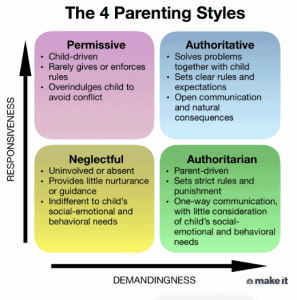
We all want to raise intelligent, confident and successful kids. But where to begin? And what’s the best parenting style to go with?
Parenting styles fall under four main categories. It might be that you use one or more of these different styles at different times, depending on the situation and context.
Research tells us that authoritative parenting is ranked highly in a number of ways: Academic, social-emotional and behavioral. Similar to authoritarian parents, authoritative parents expect a lot from their children — but they expect even more from their own behavior.
What is authoritative parenting?
Authoritative parents are supportive and often in tune with their children’s needs. They guide their kids through open and honest discussions to teach values and reasoning.
Like authoritarian parents, they set limits and enforce standards. But unlike authoritarian parents, they’re much more nurturing.
Some common traits of authoritative parents:
- Responsive to their child’s emotional needs, while having high standards
- Communicate frequently and take into consideration their child’s thoughts, feelings and opinions
- Allow natural consequences to occur, but use those opportunities to help their child reflect and learn
- Foster independence and reasoning
- Highly involved in their child’s progress and growth
Why experts agree authoritative parenting is the most effective style
Studies have found that authoritative parents are more likely to raise confident kids who achieve academic success, have better social skills and are more capable at problem-solving.
Instead of always coming to their kid’s rescue, which is more typical among permissive parents, authoritative parents allow their kids to make mistakes. This offers kids the opportunity to learn while also letting them know that their parents will be there to support them.
Authoritative parenting is especially helpful when dealing with conflict, because the way we learn to deal with conflict at a young age plays a big role in how we handle our losses or how resilient we are in our adult lives.
With permissive parents, solutions to conflicts are generally up to the child. The child “wins” and the parent “loses.” I’ve seen this approach lead to kids becoming more self-centered and less able to self-regulate.
Of course, there are times when a punishment, like taking a time out, is necessary. But the problem with constant punishment is that it doesn’t actually teach your kid anything helpful. In most cases, it teaches them that the person with the most power wins, fair or not.
Let’s say your 10-year-old son begs not to go to soccer practice: “I don’t want to because I don’t think I’m good at it.”
In response,
- A permissive parent might say, “It’s up to you.”
- A neglectful parent might say, “Whatever you want … it’s your life.”
- An authoritarian parent might say, “You have to. I don’t want to hear another word from you.”
- An authoritative parent might say, “I understand that you don’t want to go. But sometimes, fighting the urge to avoid doing something hard is how you get better!”
While authoritative parents do set limits and expect their kids to behave responsibly, they don’t just demand blind obedience. They communicate and reason with the child, which can help inspire cooperation and teach kids the reason behind the rules.
Authoritative parenting doesn’t guarantee success
While experts give authoritative parenting the most praise, it’s important to note that using just one method does not always guarantee positive outcomes.
Parenting isn’t an exact science. In many ways, it’s more like an art. As a child psychologist and mother, my advice is to be loving and understanding — but to also create structure and boundaries.
Don’t simply focus on punishment. Be supportive and really listen to your child. Ask them questions and try to understand things from their point of view. Allow them into the decision-making process so that they can grow and learn things on their own.
There’s a difference between parenting styles and parenting practices. A parenting style is the emotional climate in which you raise your child, and a parenting practice is a specific action that parents employ in their parenting.
In short, behave as the good human you want them to be.
Francyne Zeltser is a child psychologist, adjunct professor and mother of two. She promotes a supportive, problem-solving approach where her patients learn adaptive strategies to manage challenges and work toward achieving both short-term and long-term goals. Her work has been featured in NYMetroParents.com and Parents.com.
Don’t miss:






